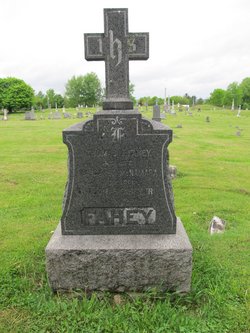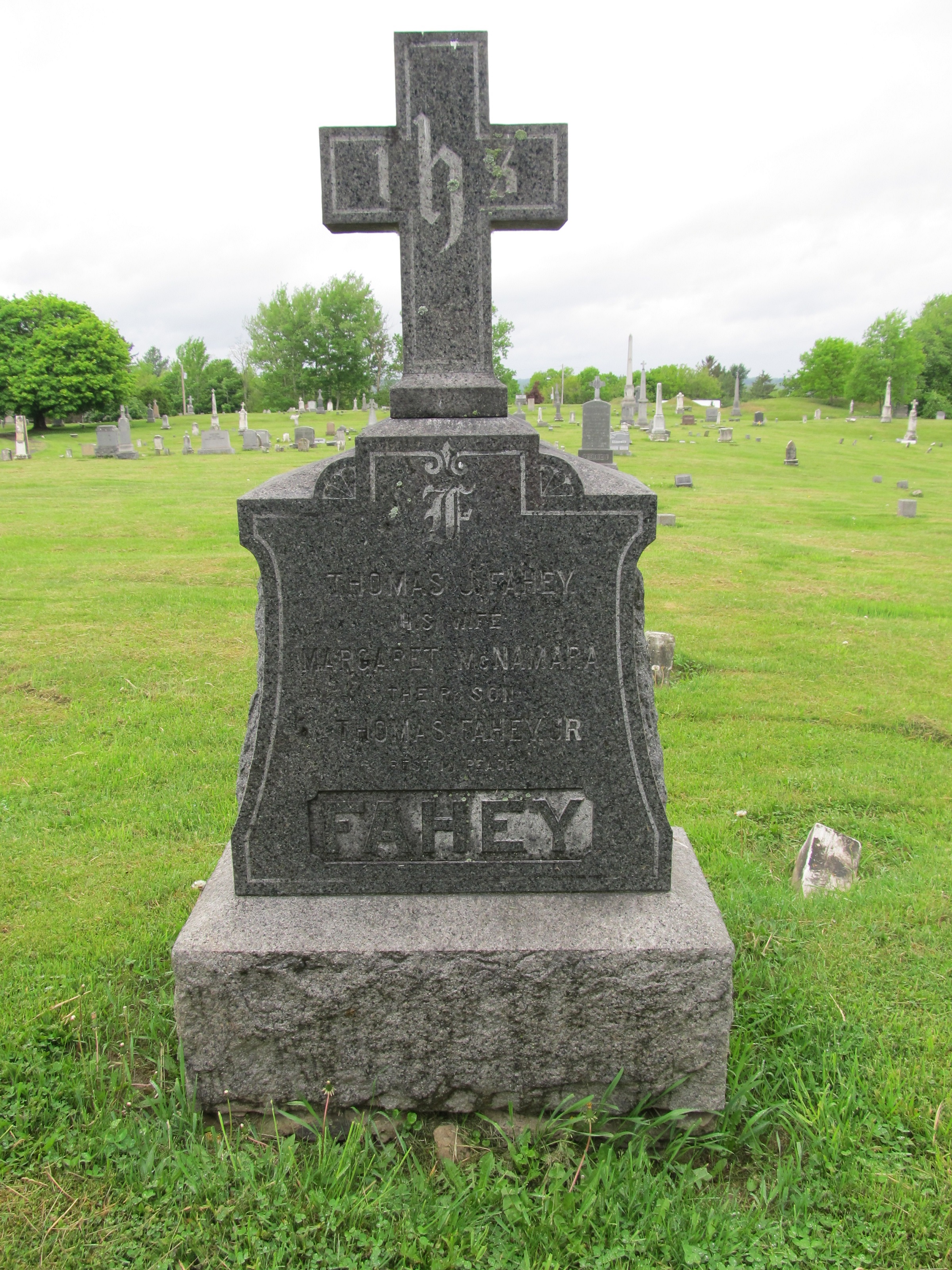The Train on the Other Track – Killed Two Young Men - An After Supper Stroll Results In Death – Terrible Work of a Locomotive.
One of the worst accidents in this city in many months occurred last evening on the Central-Hudson railroad tracks at a point known as the Powder spring. The place Is half a mile below the Iron Works passenger station. During the warm June evenings many residents of the southern part of the city indulge in strolls down the river, and the walk to the Powder spring is popular, especially among the young people.
A Train's Victims.
Thomas Fahey, aged twenty-four years, whose home was at 335 First street, and Richard Ryan, aged twenty years, who resided at 439 Third Street, started down the railroad tracks for a walk shortly before 9 o'clock last evening. The men had been laughing and chatting, and as the Central-Hudson local train leaving this city at 8:30 o'clock came whirling along the men stepped aside for the train to pass by. As they did so the Delaware and Hudson local train due in the city at 8:55 p. m. dashed upon the men, hurling both to death. Ryan met instant death. His neck was broken and the right leg almost severed from the body.
Fahey was breathing when the train, which was in charge of engineer Charles Graham and conductor James E. Layders, was brought to a standstill. Ryan's body and Fahey, who was breathing faintly, were placed In the baggage car and brought to the Union station in this city, the train arriving twenty minutes late. Fahey's skull was fractured and both arms and legs were crushed. It Is thought the wheels of the locomotive passed over both bodies.
Life Extinct.
On the arrival of the train at the Union depot the ambulance was summoned, and the bodies were removed to the undertaking rooms of J. W. Burns' Sons. Dr. Harvie arrived at the depot soon after the train came in, but he pronounced that life was extinct in both cases some time prior to his arrival.
Coroner Booth was notified, and at his direction an autopsy was held this morning.
Both young men were unmarried, and they had many friends In the southern part of the city. Fahey had been employed as a teamster by Charles McManus. Ryan was a driver on a wagon of the Donohue-Tierney-Isengart Brewing Company. The intelligence of the fatality was conveyed to the families of the young men soon after the accident Ryan's mother was prostrated by grief.
The train was running about twenty-five miles an hour, the usual speed, and the whistle had been sounded for the Iron Works station. The noise and dust caused by the south-bound train, it is thought, prevented the young men from hearing or seeing the train for the north, and they stepped directly Into the path of death.
It was stated at the Union depot this morning that the theory that the young men were killed by being confused by the trains is not correct, as the southbound train passed some time before the other train reached the point where the accident occurred. The engineer of the train said he passed the down train some distance below the point where the men were killed.
It is said further that the young men had walked some distance below the spring, and were returning on the northbound track when the accident occurred.
Coroner Booth will hold an inquest Monday evening.
The Daily Times, Troy, NY – June 13, 1896
--------------
Victims of Their Own Carelessness
Coroner Booth and a jury of which F. L. Fales was foreman conducted an inquest at the Troy jail last evening to determine the facts relative to the death of Richard Ryan and Thomas Fahey, young men killed near the Iron Works station Friday evening by a belt line train.
The witnesses included fireman Downey, engineer Graham, and conductor Layden of the train which killed the men; John Ryan and Peter Fahey, brothers of the victims, and Michael Lucey, Matthew Fagan, and Patrick Ryan who were in the vicinity.
The fireman and engineer testified that the train was running at the usual speed, twenty-five miles an hour, and that the whistle and bell were sounding when the men were struck. The engineer testified that as soon as he was the men on the track ahead of the locomotive the whistle and bell were used to warn the men.
Conductor Layden testified that he knew nothing of the accident until the train stopped.
The jury rendered the following verdict:
"That the deceased persons came to their deaths because of their own carelessness in not observing the approach of the train which killed them, and without any fault or negligence on the part of the persons operating said train."
The Daily Times, Troy, NY, Friday Afternoon, June 19, 1896
The Train on the Other Track – Killed Two Young Men - An After Supper Stroll Results In Death – Terrible Work of a Locomotive.
One of the worst accidents in this city in many months occurred last evening on the Central-Hudson railroad tracks at a point known as the Powder spring. The place Is half a mile below the Iron Works passenger station. During the warm June evenings many residents of the southern part of the city indulge in strolls down the river, and the walk to the Powder spring is popular, especially among the young people.
A Train's Victims.
Thomas Fahey, aged twenty-four years, whose home was at 335 First street, and Richard Ryan, aged twenty years, who resided at 439 Third Street, started down the railroad tracks for a walk shortly before 9 o'clock last evening. The men had been laughing and chatting, and as the Central-Hudson local train leaving this city at 8:30 o'clock came whirling along the men stepped aside for the train to pass by. As they did so the Delaware and Hudson local train due in the city at 8:55 p. m. dashed upon the men, hurling both to death. Ryan met instant death. His neck was broken and the right leg almost severed from the body.
Fahey was breathing when the train, which was in charge of engineer Charles Graham and conductor James E. Layders, was brought to a standstill. Ryan's body and Fahey, who was breathing faintly, were placed In the baggage car and brought to the Union station in this city, the train arriving twenty minutes late. Fahey's skull was fractured and both arms and legs were crushed. It Is thought the wheels of the locomotive passed over both bodies.
Life Extinct.
On the arrival of the train at the Union depot the ambulance was summoned, and the bodies were removed to the undertaking rooms of J. W. Burns' Sons. Dr. Harvie arrived at the depot soon after the train came in, but he pronounced that life was extinct in both cases some time prior to his arrival.
Coroner Booth was notified, and at his direction an autopsy was held this morning.
Both young men were unmarried, and they had many friends In the southern part of the city. Fahey had been employed as a teamster by Charles McManus. Ryan was a driver on a wagon of the Donohue-Tierney-Isengart Brewing Company. The intelligence of the fatality was conveyed to the families of the young men soon after the accident Ryan's mother was prostrated by grief.
The train was running about twenty-five miles an hour, the usual speed, and the whistle had been sounded for the Iron Works station. The noise and dust caused by the south-bound train, it is thought, prevented the young men from hearing or seeing the train for the north, and they stepped directly Into the path of death.
It was stated at the Union depot this morning that the theory that the young men were killed by being confused by the trains is not correct, as the southbound train passed some time before the other train reached the point where the accident occurred. The engineer of the train said he passed the down train some distance below the point where the men were killed.
It is said further that the young men had walked some distance below the spring, and were returning on the northbound track when the accident occurred.
Coroner Booth will hold an inquest Monday evening.
The Daily Times, Troy, NY – June 13, 1896
--------------
Victims of Their Own Carelessness
Coroner Booth and a jury of which F. L. Fales was foreman conducted an inquest at the Troy jail last evening to determine the facts relative to the death of Richard Ryan and Thomas Fahey, young men killed near the Iron Works station Friday evening by a belt line train.
The witnesses included fireman Downey, engineer Graham, and conductor Layden of the train which killed the men; John Ryan and Peter Fahey, brothers of the victims, and Michael Lucey, Matthew Fagan, and Patrick Ryan who were in the vicinity.
The fireman and engineer testified that the train was running at the usual speed, twenty-five miles an hour, and that the whistle and bell were sounding when the men were struck. The engineer testified that as soon as he was the men on the track ahead of the locomotive the whistle and bell were used to warn the men.
Conductor Layden testified that he knew nothing of the accident until the train stopped.
The jury rendered the following verdict:
"That the deceased persons came to their deaths because of their own carelessness in not observing the approach of the train which killed them, and without any fault or negligence on the part of the persons operating said train."
The Daily Times, Troy, NY, Friday Afternoon, June 19, 1896
Family Members
Advertisement
Explore more
Sponsored by Ancestry
Advertisement






